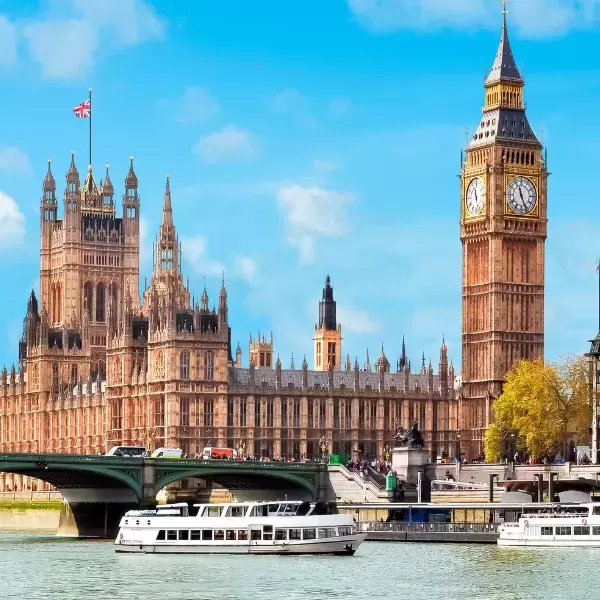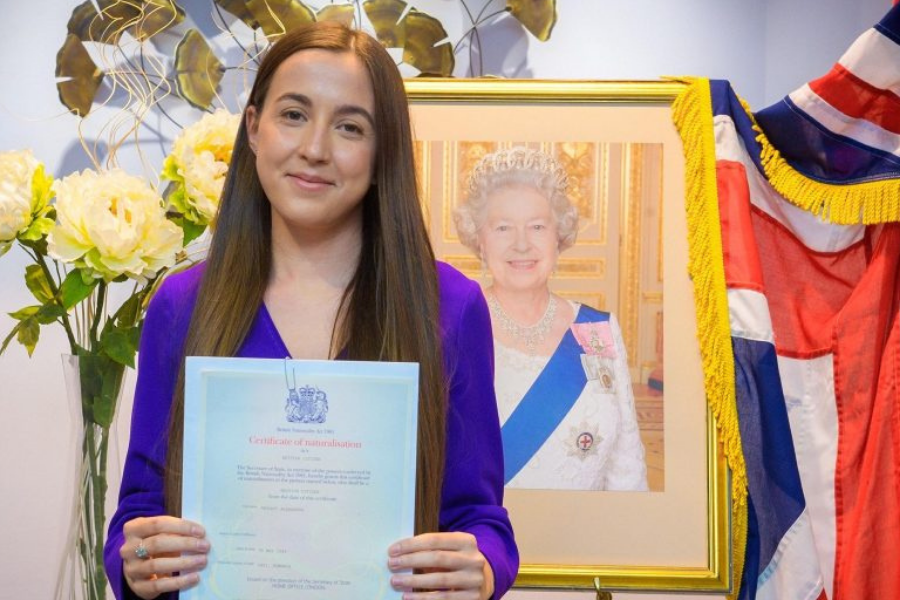EU citizens and the pathway to citizenship
Citizenship is special – but we do not make it special by setting unnecessary barriers
Alberto Costa MP in his foreword to the enquiry by British Future ‘Barriers to Britishness'
Becoming a British citizen – aspirations and unnecessary barriers
When we are born, we come into a family, and their first gift to us is citizenship. It is not something we choose, and most of us won’t give it much thought throughout our lives.
Instead, this is something we feel, such as the pride in our nation, a strong sense of belonging to our communities, and a set of values that forms the core of our identity. Some of us will move from our place of birth to another country, and it will change our core values and identity.
Many immigrants tell the story of how they fell in love with the UK, the country they chose and how British values have become part of their own identity. Many will then aspire to naturalisation, as a way to secure the legal and social status associated with British citizenship, and be considered as equal for the rest of their lives in the country they now call home. They want British citizenship for themselves but also their children - children are not guaranteed citizenship even if born here.
According to the British Future inquiry report ‘Barriers to Britishness’ published in December 2020, 75% of non-EU foreign nationals who entered the UK in 2005 had become British by 2018. The percentage of EU citizens who have been granted British citizenship over the same period is significantly lower at 11%.
EU citizens are now the largest group of foreign nationals in the UK and are likely to follow the naturalisation trends of previous generations of immigrants. As the CEO of the3million, I feel there is an inevitability about millions of EU citizens and their children becoming British in the long term and I want to raise awareness about this issue and answer the questions I asked myself before researching more about it:
-
Why are we talking about citizenship when millions of EU citizens have successfully applied to the EU Settlement Scheme?
-
What does the British public think about the issue?
-
What does the Government say about pathway to citizenship?
-
What are the barriers?
1 - Why are we talking about citizenship when millions of EU citizens have successfully applied to the EU Settlement Scheme?
Settled status is an immigration status
The number of successful applications to the EU Settlement Scheme demonstrates the intention of millions of EU citizens in the UK to continue to live in the UK and be part of society.
An immigration status is not equal to the legal and social status associated with British citizenship though. Over the last 5 years, we have noticed a strong aspiration among EU citizens in the UK to be treated as equal to their British spouses, family members, friends, and colleagues.
They want to be part of the society they are contributing to. They want representation in Parliament. They want the gold standard of identity in the UK. They want a secure and solid status for their children growing up in Britain.
There has been a new trend since the referendum
The annual number of EU citizens applying for registration and naturalisation since 2016 has more than doubled compared to the period 2004-2016.
The trend is underpinned by the aspiration to become British: 60% of respondents to a poll in the3million’s private Facebook group with over 45,000 EU citizens told us they are aspiring to become British in the future.
An uneasy pathway to citizenship
However, the numbers don’t add up: only 257,604 EU citizens in the UK have applied for British citizenship since the beginning of 2016 whereas nearly 6 million people have successfully applied to the EU Settlement Scheme, with over 3 million of them potentially eligible for citizenship, having fulfilled the 5-year residency requirement.
According to the British Future report ‘Barriers to Britishness’, the low uptake is due to unnecessary barriers that prevent the naturalisation of EU citizens due to complexities and anomalies in the law. We explain further in point 4.
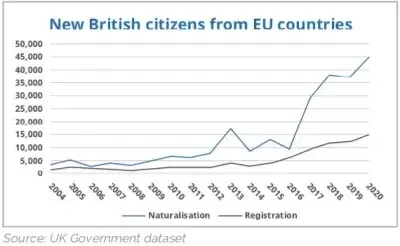
2 What does the British public think about the issue?
We commissioned a survey by ICM to understand whether the British public was at ease with the idea of EU citizens becoming British.
The results show strong support across the political spectrum for the pathway:
Excluding those who did not express an opinion, a large majority of all adults in Britain support the naturalisation of EU citizens living in the UK as a pathway to British citizenship (73%), while around one in four people oppose such a pathway (27%).
Support is strong across the political spectrum:
People who voted Conservative at the 2019 general election are supporting this pathway to citizenship (64% support vs 36% oppose) with even more robust support from Labour voters (84% support vs 16% oppose) and Liberal Democrat voters (86% support vs 14% oppose).
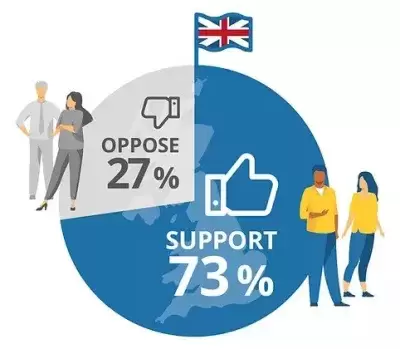
3 What is the Government saying about the pathway to citizenship?
When researching the issue, I came to the unexpected conclusion that the Government does not have a positive stance on the topic. For most countries, citizenship is the endpoint, and the pathway to citizenship is promoted as an integration tool for their immigrant population.
At a minimum, the Government needs to develop a national narrative by making a positive case on the issue, removing anomalies and unnecessary hurdles, and delivering fairness by making it accessible to eligible people.
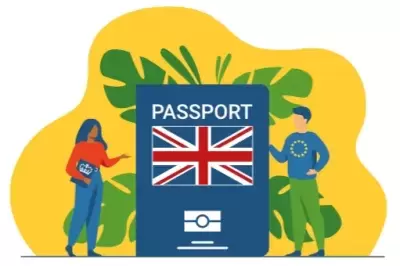
4 What are the barriers?
The pathway to citizenship is unnecessarily complicated to navigate for aspiring British citizens due to the complexity of British nationality law.
Many EU citizens perceive the application process as uncertain, with little connection to the real world.
The key barriers for EU citizens are:
- Complicated rules regarding eligibility, with a different route for adults (naturalisation) and children (registration), and the absence of birthright citizenship (also called Jus soli, which the UK had before the British Nationality Act 1981 came into force);
- Prohibitive cost: the cost of naturalisation to the Home Office is £372, but the cost for applying is £1,330, which is the highest of the countries we analysed (Australia £162, Germany £234, USA £570). The fee is not refundable if unsuccessful;
- There is an anomaly for EU citizens who didn’t subscribe to an obscure Comprehensive Sickness Insurance (CSI) policy when they studied or cared for a dependent in the UK; It affects the assessment of their continuous lawful residence as part of the good character requirement, thus stopping many from applying in fear of losing their application fee if unsuccessful due to this technicality; an amendment to the Nationality and Borders bill currently debated in the House of Lords could end the anomaly, if adopted. Read more about our campaign here;
- No legal aid available to support applicants, leaving the most vulnerable EU citizens unable to apply;
- The allowed period of absences from the country to qualify for naturalisation is more restrictive than for the EU Settlement Scheme, creating an unnecessary eligibility barrier for those wishing to naturalise after having been granted settled status;
- The ‘Life in the UK’ test doesn’t prepare people to live in the UK and is not a tool to impart useful knowledge for aspiring British citizens.
It’s worth mentioning that there is an added barrier for nationals of Austria, Estonia, Germany, Lithuania, Netherlands, Poland, and Slovakia. Their country does not allow dual nationality, and EU citizens from these countries may have to renounce their original nationality to become British citizens or obtain an exemption in certain cases, but this is not something the UK Government can fix.
5 Ease the pathway to British citizenship to make it accessible and relevant
In 2017, the3million held a rally near Parliament in London under the banner ‘THIS IS OUR HOME’. Since then, the Government has often repeated that we are their friends, colleagues and neighbours and they wanted us to feel at home. We want to feel at home, so why not make the pathway to citizenship accessible and relevant?
In his foreword to the British Future inquiry ‘Barriers to Britishness’, Alberto Costa MP summed the issue perfectly : “Citizenship is special – but we do not make it special by setting unnecessary barriers.”
You can have rules, so becoming British is meaningful, but anomalies and barriers as they currently exist do not lean towards fairness in the process:
- The Government needs to make a positive case for citizenship for those who chose to make the UK their home and make clear to EU citizens that settled status is a pathway to citizenship;
- Restore birthright citizenship and make the registration rules for children clearer and simpler, so the pathway to citizenship for minors who spent the majority of their lives in the UK is not a headache for their parents or carers;
- Similarly, the pathway to citizenship for adults requires more straightforward eligibility rules. For the more complicated cases, restore legal aid, so the complexity of the process won’t prevent those who cannot afford a lawyer;
- Lower the fees of registration and naturalisation to cost- price, so the price is not a barrier for those with modest incomes;
- Formally remove the Comprehensive Sickness Insurance criteria for settled status holders wishing to naturalise;
- Make the ‘Life in the UK’ test relevant and fit-for-purpose. People who made the UK their home celebrate the country for its culture and values, yet the test is little less than a series of unrelatable trivia.
Five years ago, I wrote an article for the think-tank Bright Blue to express my optimism about EU citizens’ future in the UK, as long as the Government would show intent based on the British values of fairness and compassion.
In 2022, easing the pathway to citizenship is a good place to renew that intention, so the aspirations of EU citizens settled in the UK can be met, and our common future can continue to be underpinned by these British values for the benefit of the whole society.
Source:
British Future inquiry report ‘Barriers to Britishness’: https://www.britishfuture.org/publication/barriers-to-britishness-report-of-the-alberto-costa-inquiry-into-citizenship-policy/
Free Movement Blog briefing ‘The pathway to British citizenship for European nationals in the UK’:
https://www.freemovement.org.uk/british-citizenship-european-citizens-in-the-uk/
Kings College report ‘Why it’s time to talk more about citizenship’:
https://www.kcl.ac.uk/news/unsettled-status-why-its-time-to-talk-more-about-citizenship
Liverpool University report ‘EEA Children and citizenship’: https://www.liverpool.ac.uk/media/livacuk/law/2-research/ecru/EEA,Children,and,British,Citizenship,-,September,2020.pdf
Migration Observatory report ‘Citizenship and naturalisation for migrants in the UK’: https://migrationobservatory.ox.ac.uk/resources/briefings/citizenship-and-naturalisation-for-migrants-in-the-uk/
the3million briefing on Comprehensive Sickness Insurance: Fixing the Comprehensive Sickness Insurance (CSI) legacy
the3million citizenship fee comparison table: https://docs.google.com/spreadsheets/d/1Z6V-OibPl1YhoNVQji2oEDbHz8ptNN7atKkN8VJx4Qo/edit#gid=0
the3million Forum for EU citizens poll: https://www.facebook.com/groups/Forum4EUcitizens/permalink/2740087062975656/
UK Government – EU Settlement Scheme statistics:
https://www.gov.uk/government/collections/eu-settlement-scheme-statistics
UK Government – How many people continue their stay in the UK or apply to stay permanently
https://www.gov.uk/government/statistics/immigration-statistics-year-ending-september-2021/how-many-people-continue-their-stay-in-the-uk-or-apply-to-stay-permanently
UK Government – Nationality and borders bill:
https://bills.parliament.uk/bills/3023/publications
UK Government – Naturalisation and registration dataset:
https://www.gov.uk/government/statistics/immigration-statistics-year-ending-september-2021
UK Government – Policy statement by the Home Secretary on 24 March 2021 ‘New plan for immigration’:
https://assets.publishing.service.gov.uk/government/uploads/system/uploads/attachment_data/file/972517/CCS207_ CCS0820091708-001_Sovereign_Borders_Web_Accessible.pdf
UK in a changing Europe ‘How EU families are coping with Brexit uncertainty’:
https://ukandeu.ac.uk/how-eu-families-in-britain-are-coping-with-brexit-uncertainty
